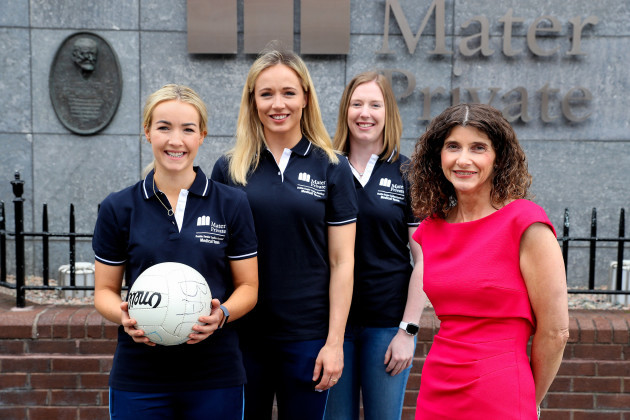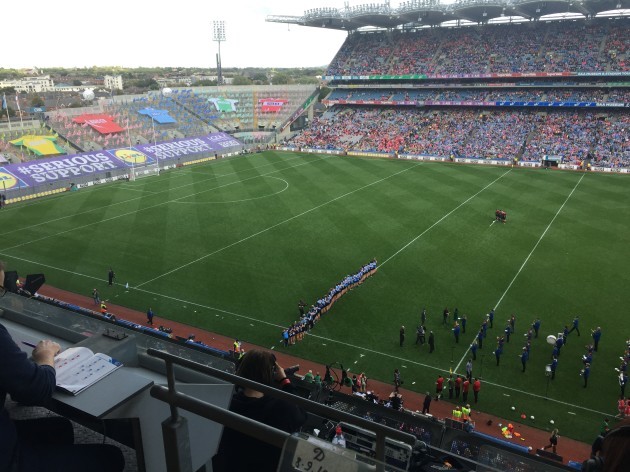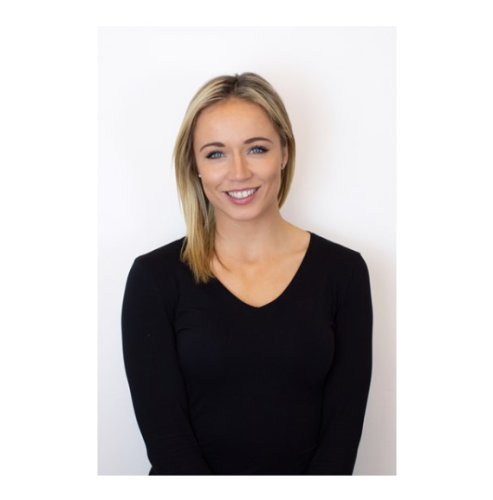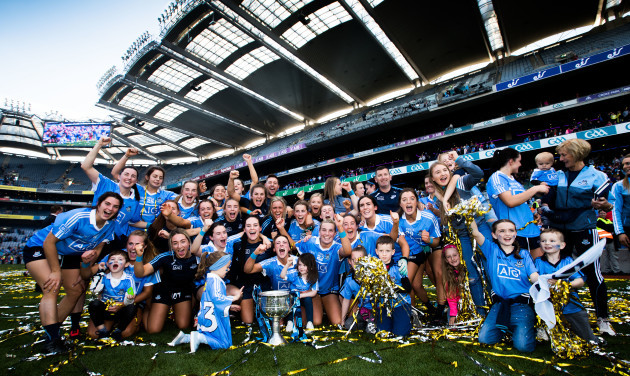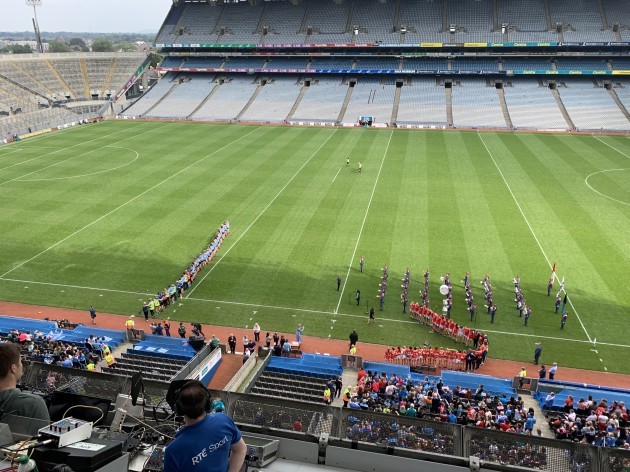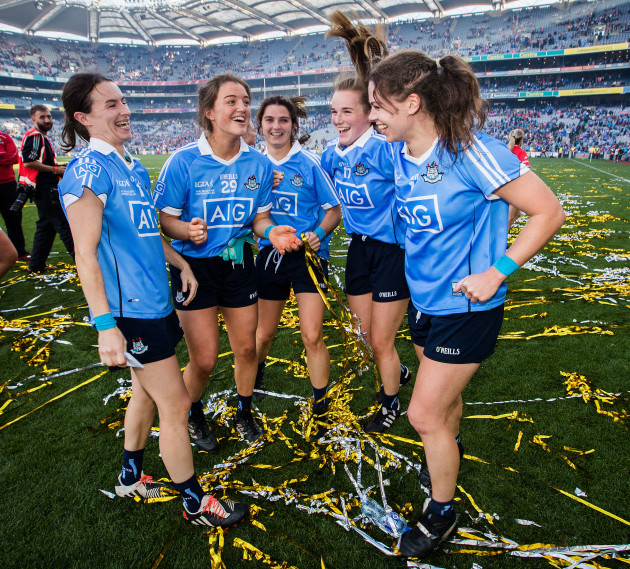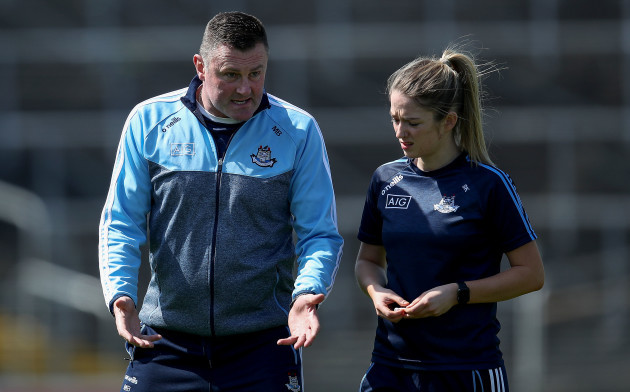AN EXAMPLE OF how far we’ve come to start off.
When Dr Katie Lydon suffered a devastating career-ending injury 13 years ago, she had no choice but to step away from her blossoming athletics career.
Now the Dublin ladies doctor, Lydon detached her hamstring from her ischial tuberosity, or how many may recognise it: the same injury that Paul O’Connell had, where one basically rips the muscle off the bone.
That, also, was a career-ending injury for Munster and Ireland legend O’Connell, but he was coming to the end of his playing days. In another rugby example, Cian Healy made it back from the horror setback.
Likewise, Dublin ladies star Siobhán Killeen and Galway’s Dora Gorman suffered the same cruel fate earlier this year and have both undergone surgery and are on their respective roads to recovery.
It shows just how far things have come on the medical side of sport.
“When I did that, for instance, there was no surgical option,” Dr Lydon explains. “The only option for me was conservative management. Now, you’ve got a whole host of individuals who can operate, and that just wasn’t the case back when I was competing.
“I did compete to an international level and was aspiring to further international glory, but it wasn’t to be purely because there was no one at the time willing to operate or assist.
“It’s very unfortunate, but it propelled me and is my driving force into helping these individuals obtain their own sporting goals.”
***
The team behind the team is often forgotten about. Aside from the boss, the majority of those involved in management in an inter-county set-up fly under the radar. We see faces and hear names, but often don’t learn stories.
The Dublin ladies backroom team is a massive operation. You’ll see it for yourself before the throw-in 4pm at Croke Park tomorrow, as Mick Bohan’s troops stand together, arms around one another, for the National Anthem ahead of their All-Ireland final showdown with Galway.
Coaches, selectors, a psychologist, liason officer, kit man, physiotherapist, doctor, performance nutritionist; you name it. They’ll all be there. And have been through thick and thin for this team.
Their physio, Anita O’Brien, came on board ahead of the 2017 season. A Trinity College Dublin graduate and Masters recipient who opened her own practice this year, O’Brien was introduced to Bohan that January and hasn’t looked back since.
That year, of course, the Sky Blues won their first All-Ireland since 2010. And they made it a double last September, capping performance nutritionist Kate McDaid’s first year involved on a high.
From speaking to McDaid, O’Brien and Dr Lydon, enjoyment in their roles is the main thing that shines through. They each stress how engaging the players are and how brilliant they are to work with.
“Oh my God, an absolute pleasure,” McDaid tells The42. “Having played competitive sport myself and just being in with players who are so driven, so hungry and really just lovely people too… they really are just wonderful to work with, so it makes my job even that bit more enjoyable to have the group I’m dealing with on a daily basis.”
“Yes, the commitment is huge but they’re such a fantastic group to work with,” O’Brien echoes her words. “You have so much fun with them as well, it’s not just work for them. I get on really well with the management team and the girls. They’re a great bunch to work with.”
Dr Lydon, who studied medicine between UCD and her native Galway because of that career-ending injury and then went down the sports medicine route, first got involved with the team this year following Professor John O’Byrne of Cappagh National Orthopaedic Hospital’s suggestion.
She’s a musculoskeletal tutor there while completing her Masters and a thesis with the Irish Sport Institute, and was delighted to come into the fold.
“This is the first time they have had a doctor on board,” she smiles. “We are the only county, as far as I’m aware, and from all our games so far, the first county to have a doctor involved with the team in a full-time capacity.”
It’s the first female team she’s been fully engaged with too, but is well versed to compare and contrast with men’s set-ups after travelling with the Ireland hockey team to the World Cup in India last year.
McDaid and O’Brien reckon that females are generally more open about life both on and off the pitch, and Dr Lydon agrees. But there’s one big difference.
“What I’ve noticed, and considering my research is in the area is menstrual cycle disorders, which obviously our male counterparts are fortunate not to discover,” she says, adding that her research is in how to manage pre-menstrual syndrome in elite athletes.
“I can offer that little bit more to the women. I guess it’s a taboo subject and as a population, we generally don’t talk about it. I think that’s largely because in a lot of female sports, the coaching and management staff is largely male-orientated. In a lot of instances they’re not going to be able to offer little if any guidance on how to manage it.
“We’ve current research that suggests that about 48% of the general population that are involved in physical activity suffer from PMS. That hampers their performance and ability to train, but you need to look outside that as well: the ability to concentrate, you get more emotional.
“It’s very hard for an individual to say to a management team, ‘Listen, it’s my time of the month. I’m struggling at the moment,’ when there’s spots to be obtained on a team. And literally these girls put their heart, soul, guts into obtaining that spot.”
That’s been highlighted, more and more recently, she adds, but says there needs to be a “greater understanding of the challenges women face, not only on the sports field, to get them to a stage which they can compete at a high level.”
McDaid also touches on that, and the fact that the players are tracking their menstrual cycles to aid their performance and to reduce injury on the FitrWoman app.
“That cycle’s going to have an impact on their training and how they’re feeling,” the Dublin native says. “That was something we definitely looked at a little bit more that season in particular.
“There’s only so much that can change. We obviously can’t be doing different training sessions for different athletes the whole time or anything like that, but it makes us aware of who’s not feeling great.
“Maybe someone needs to work a little bit more on their recovery because they’re at whatever stage of their cycle. It’s a really interesting eye-opener for myself, for the backroom team and also for the girls; it was a nice learning curve.
She continues: “It’s probably still a little bit of an, ‘Ugh’ topic that some people don’t want to be talking about but it definitely does help. One of the positives from a social media perspective is that message is filtering through and through more and more. It makes it more normal.
“It shouldn’t be anything that we’re uncomfortable about or anything that we should feel some type of way about but I suppose it is a little bit uncomfortable for some people, so seeing the message a lot more, being a lot more prevalent, it helps people get over that little barrier.
“We still have a long way to go from a research perspective, we are learning a lot but we’re all different as individuals and menstrual cycles are so different on a person-to-person basis so aside from that, there’s still a lot that we need to learn and figure out.
“It’s definitely something that has an impact on performance anyway, it’s just about managing it and managing the girls as best as we can with that knowledge.”
The same amount of training, time and effort is put in at a high level, O’Brien nods.
“In terms of preparation, regardless of whether you’re male or female you’re going to have to cover your nutrition, your recovery strategies post-training, getting enough sleep and hydration and that’s the same across the board really.”
As physio, she’d generally be at every training session — so gym once a week, and two to three pitch sessions, depending on the match schedule — observing, assessing injuries, doing rehab with injured players and managing their training load.
That’s all part of the job spec of course, but it’s not just that. She’s a sounding board to the players, and not strictly a physio.
“You do have to keep a professional boundary but you are with them so much,” she says. “You get to know them, particularly the girls who have been with the group for three seasons now and more, you get really close to them.
“Particularly the girls that are injured, you tend to know them more. You do get close to them, you take an interest in their lives and what’s going on with them outside of football.”
Anyone who’s been through a lengthy injury understands how mentally-tolling it can be, so having someone there to speak with and a solid support system in place is hugely important.
And they have just that in the set-up, O’Brien assures: “It’s hard when players get injured but it is a contact sport, injuries will happen.
“Generally, the girls on the pitch are assessed by myself. If needed then Katie, the team doctor, will get involved and they’ll go to NutriKate [McDaid] as well about their nutrition and their return to play.
“As well as that, we’ll talk about injuries and the return to play with themselves and members of management. There’s a really good psychologist on the team, she’s a coach as well but she’s really, really good at talking to the girls and helping them through tough times too.”
O’Brien and Dr Lydon work in tandem on the more medical side of things while the nutritional interaction comes from McDaid: food and supplements to aid recovery, how to manage Irritable Bowel Syndrome [IBS] and other common problems are all looked at.
It’s all about instilling habits and preparation along the way, McDaid explains.
“When it comes to the big occasions, things are just routine,” she continues, honing in on recovery and healthful habits like adequate sleep and eating plenty of fruit and veg, “everyone’s very comfortable and it’s almost like the nutrition element is very much second nature.
“A lot of the stuff, we would have implemented last year and there’d just be little things like that that you re-iterate and remind as the season goes on and the weather changes.
“A lot it would be second nature to them and it’s just a case of putting up a few reminders here and there so everyone is very confident — especially looking to check in with the girls on a one-to-one basis just to make sure everyone is in a good space and they’re all happy with what they’ve been doing up to now.
“It’s just about those reminders, and being very aware of who you’re dealing with. I am dealing with individuals who also have a million things on their plate. It’s like, ‘How can I get this message across in a manner that sits with them and they can act upon.’”
All three appreciate the immense support provided by the Mater Private Hospital, who this year, agreed a partnership to provide medical and healthcare support to the Dublin ladies.
Scans are available quickly and easily if necessary for an injured player, as is access to the subsequent imagery and appointments if needed.
As captain Sinéad Aherne noted earlier this week, when she started out 15 years ago there was no guarantee a physio would be present at a match and now, each player’s health insurance is being looked after.
“It’s huge,” Dr Lydon agrees. “The girls spend so much of their own time, be that away from work — many of them can’t work full-time due to the commitments required by training — so it’s nice to know that they are protected in some way.
“If they get injured they can rely on the fact that they are going to get some financial support. Absolutely, they have the medical backroom team that are going to look after them.
“The Mater Private are pumping a lot of money into the Dublin ladies at the moment. This has huge repercussions because other sporting organisations are going to look at this and realise that in order to create world-class athletes, and in the context of Gaelic football, in order to propel the sport even further, these athletes should most definitely have a strong, medical backroom team to support them in their endeavours.”
The medical progression has been massive through the years, as seen from that earlier example, but not just that, it’s little things.
“Irrespective of whether it’s a female athlete or a male athlete, in general, I think people are tying the dots together a lot better,” McDaid nods. “Things like recognising that we need to manage load, that it’s not a case that we’re absolutely dogging players day in, day out and [thinking] that’s going to make them better.
“Recognising that down time and team building is as important as the training in some ways, and I suppose giving people a more rounded picture… things like mindfulness and the psychology element is becoming more recognised and rightly so.
“That obviously paired with the nutrition and being aware of the need for recovery sessions whether it’s going swimming in the sea or whatever it may be, that that’s being given to the athlete too. That’s the complete picture, it’s not just, ‘Okay, arrive to training and we’re just going to run the legs off you and alright, see ye now.’
“Gradually, slowly but surely, people are starting to take that into account more. I think that’s happening, it’s definitely happening on the men’s side but also the female side which is great to see.
“We obviously still have a long way to go to really give every athlete the correct support.”
But the Dublin ladies — and Dr Katie Lydon, Kate McDaid and Anita O’Brien — are definitely a shining example of leading the way at this present moment. And their ability to work together as a unit sure helps that.
“It’s fantastic,” McDaid smiles. “It’s great to have a sounding board if there’s any apprehension or whatever; three minds working for the wellness of a player is always better than one. I think we compliment each other nicely.
“It’s been an absolute pleasure having two such professional women involved and working alongside me. It’s invaluable for my own practice as much as anything else.”
And O’Brien most definitely agrees.
“It’s really good that we all work together and all have our input to try and get the player back as quickly as possible,” she concludes, with all eyes on tomorrow’s throw-in.
“The buzz around the camp is unbelievable, it’s hard to describe. The feeling is unbelievable. Everyone is so focused on Sunday now and hopefully getting three in-a-row. But everyone will enjoy the season, whatever the outcome.”
The42 is on Instagram! Tap the button below on your phone to follow us!
